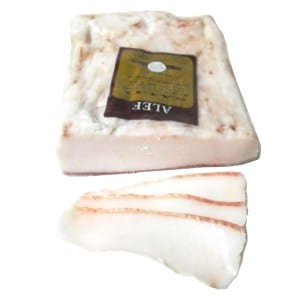Nutritional value and chemical composition.
| Nutrient | Quantity | Norm** | % of the norm in 100 g | % of the norm in 100 kcal | 100% normal |
| Caloric value | 816 kCal | 1684 kCal | 48.5% | 5.9% | 206 g |
| Proteins | 1.4 g | 76 g | 1.8% | 0.2% | 5429 g |
| Fats | 90 g | 56 g | 160.7% | 19.7% | 62 g |
| Water | 5.5 g | 2273 g | 0.2% | 41327 g | |
| Ash | 3.1 g | ~ | |||
| Vitamins | |||||
| Vitamin A, RE | 10 μg | 900 μg | 1.1% | 0.1% | 9000 g |
| Retinol | 0.01 mg | ~ | |||
| Vitamin E, alpha tocopherol, TE | 1.7 mg | 15 mg | 11.3% | 1.4% | 882 g |
| Vitamin PP, NE | 0.3 mg | 20 mg | 1.5% | 0.2% | 6667 g |
| niacin | 0.1 mg | ~ | |||
| Macronutrients | |||||
| Potassium, K | 15 mg | 2500 mg | 0.6% | 0.1% | 16667 g |
| Calcium, Ca | 2 mg | 1000 mg | 0.2% | 50000 g | |
| Sodium, Na | 1170 mg | 1300 mg | 90% | 11% | 111 g |
| Phosphorus, P | 15 mg | 800 mg | 1.9% | 0.2% | 5333 g |
| Chlorine, Cl | 1837 mg | 2300 mg | 79.9% | 9.8% | 125 g |
| Trace Elements | |||||
| Iron, Fe | 0.1 mg | 18 mg | 0.6% | 0.1% | 18000 g |
| Iodine, I | 9.7 μg | 150 μg | 6.5% | 0.8% | 1546 g |
| Copper, Cu | 10 μg | 1000 μg | 1% | 0.1% | 10000 g |
| Sterols | |||||
| Cholesterol | 85 mg | max 300 mg | |||
| Saturated fatty acids | |||||
| Saturated fatty acids | 40 g | max 18.7 г | |||
| Polyunsaturated fatty acids | 9.5 g | from 11.2 to 20.6 | 84.8% | 10.4% |
The energy value is 816 kcal.
- Vitamin E possesses antioxidant properties, is necessary for the functioning of the gonads, heart muscle, is a universal stabilizer of cell membranes. With a deficiency of vitamin E, hemolysis of erythrocytes and neurological disorders are observed.
- Chlorine necessary for the formation and secretion of hydrochloric acid in the body.
Energy value, or calorie content Is the amount of energy released in the human body from food during digestion. The energy value of a product is measured in kilo-calories (kcal) or kilo-joules (kJ) per 100 grams. product. The kilocalorie used to measure the energy value of food is also called the “food calorie,” so the kilo prefix is often omitted when specifying calories in (kilo) calories. You can see detailed energy tables for Russian products.
The nutritional value – the content of carbohydrates, fats and proteins in the product.
Nutritional value of a food product – a set of properties of a food product, in the presence of which the physiological needs of a person for the necessary substances and energy are satisfied.
Vitamins, organic substances required in small quantities in the diet of both humans and most vertebrates. Vitamins are usually synthesized by plants rather than animals. The daily human need for vitamins is only a few milligrams or micrograms. Unlike inorganic substances, vitamins are destroyed by strong heating. Many vitamins are unstable and “lost” during cooking or food processing.










